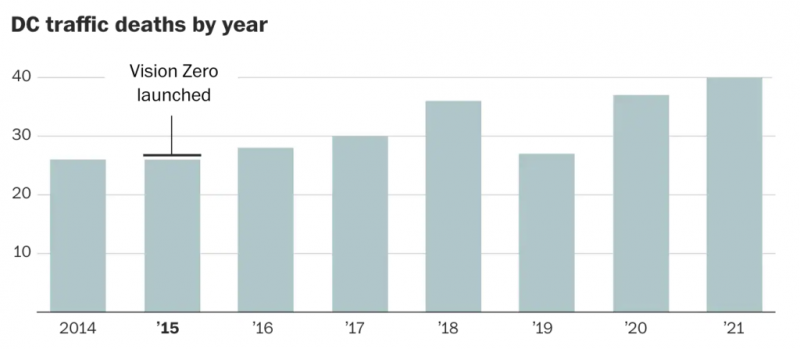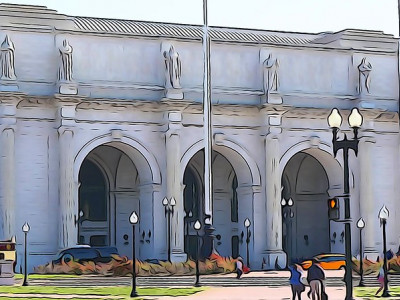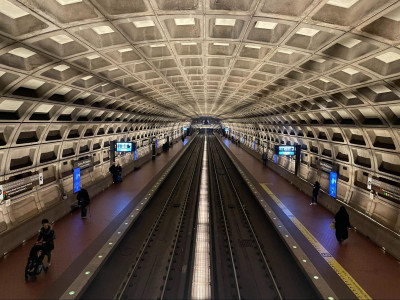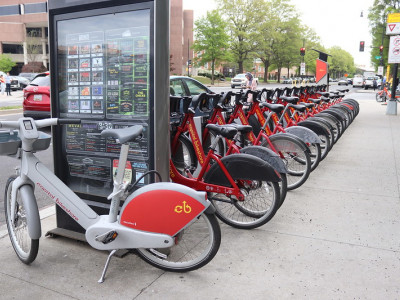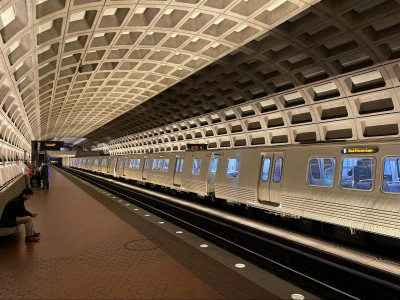Fake tags are a real problem
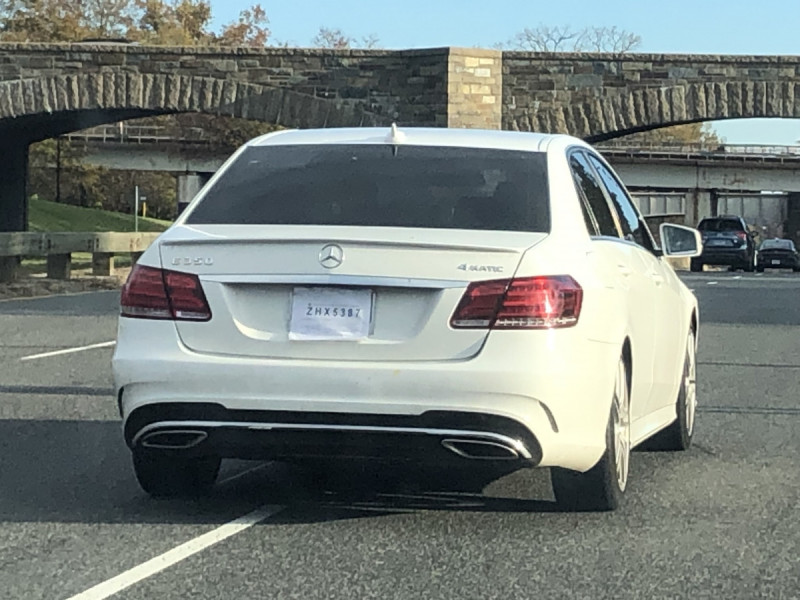
A dubious tag seen on a vehicle on a DC-area street. Photograph taken from a passenger seat by Caitlin Rogger.
A version of this post originally appeared on the author’s personal blog.
As a bicyclist, I am always ready to believe the worst about drivers. Drivers are why I’m woken up by gunning engines in the middle of the night. Drivers are why I have titanium screwed into my collarbone. Drivers! That I bring my children to school by bicycle every weekday morning has only raised the stakes and, along with it, my ire.
Despite this, I have been exposed to enough safe streets rhetoric to be convinced that making our streets less deadly is about how we build, not who we blame. Incompetence and inattention are inevitable human foibles. We know drivers will make mistakes and it is more productive to ameliorate those mistakes’ effects than to obsess over how we will punish them.
I buy this, with one exception. I get angry at drivers who don’t try. The ones who refuse to accept that they have a responsibility to others and that they consequently must make an effort. The ones who selfishly exempt themselves from the rules. The ones who choose lawlessness. I get very angry at them.
And recent years have provided a new signal that such a driver is near: the fake temporary tag. All of a sudden, it seemed, paper tags were everywhere. Often they were on credible-seeming vehicles – ones that looked new, or at least newly washed. But sometimes the expiration date had passed. And as the months wore on, they started showing up on increasingly implausible beaters.
Image by Matt Ficke used with permission.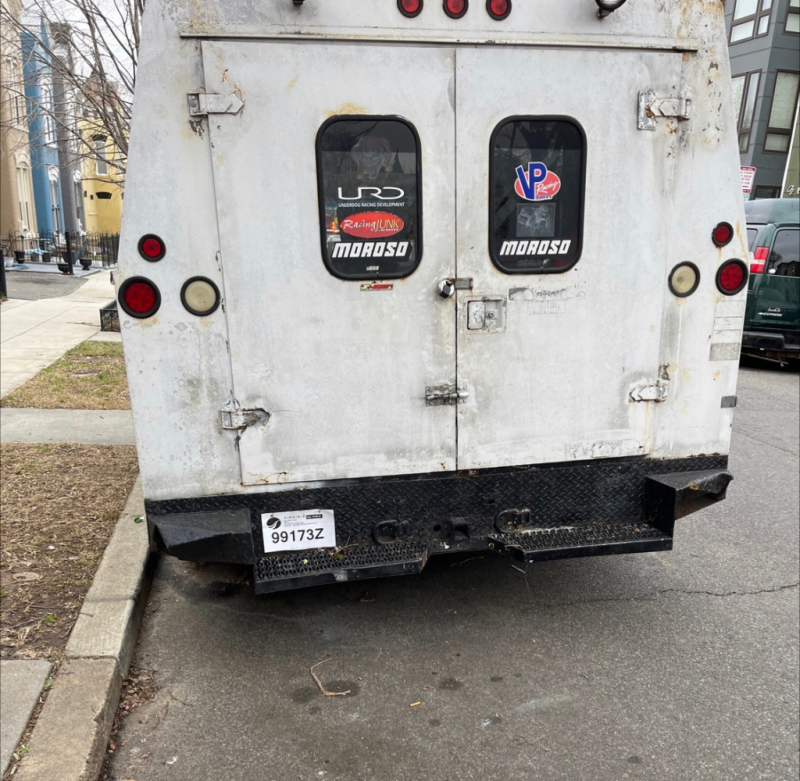
These days it’s obvious: fake tags are part of the scofflaw trinity, along with defaced plates and opaque plate covers.
The reason this trend started is equally obvious: automated traffic enforcement, or ATE. The city’s speed cameras annually collect more than $100 million in fines from area drivers. And that’s just DC’s cameras! Compared to the era that preceded them, these systems have made enforcement of traffic laws shockingly consistent. Although it’s common to hear grumbling that traffic cameras are just a cash grab by local government, the evidence for ATE’s positive effect on safety is strong. Even AAA – a reliably brash proponent of motorists’ most chauvinistic impulses – has grudgingly admitted as much.
The relative scale of automated enforcement is immense. Enforcement of traffic laws by humans is, by comparison, so constrained as to be irrelevant. ATE dramatically increases the frequency with which drivers are punished.
Monthly moving violation citation counts as provided via opendata.dc.gov. ATE citations are reported under the agency code “special operations - traffic.” 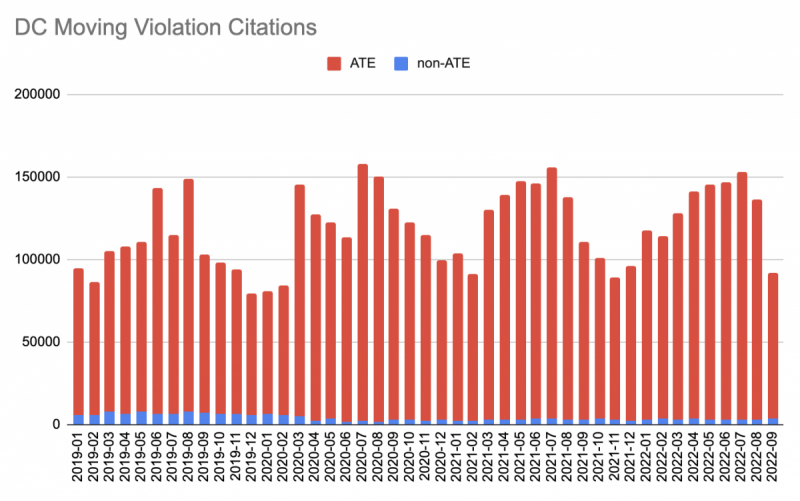
ATE transformed citations from an occasional episode of motorist misfortune – not so different from a flat tire – to a persistent nuisance. But ATE systems work by connecting a license plate back to a driver. Sever that connection and the citation will never find its target. Some drivers have realized this and taken steps to end the frustration that ATE represents.
I think this is easy to understand. Spend any time near DC roads, and it’s easy to see, too. But why isn’t anyone doing anything about it?
DC has given up
The city convened a task force about fake tags, which did a study, and then decided not to do anything. Why? From the task force:
"Although the Task Force convened to determine options available to move forward, with the assistance of the Mayor’s Office of Racial Equity, it was ultimately determined not to move forward with many of the initial ideas due to the possible negative impact on people of color. Therefore, law enforcement continues to enforce fake temporary tags using their existing processes."
This might sound bizarre, but it actually makes a sad kind of sense. DC’s traffic cameras are more prevalent in Black neighborhoods.
Map of DC speed-related crashes and speed camera locations as of 2017 by DC Policy Center.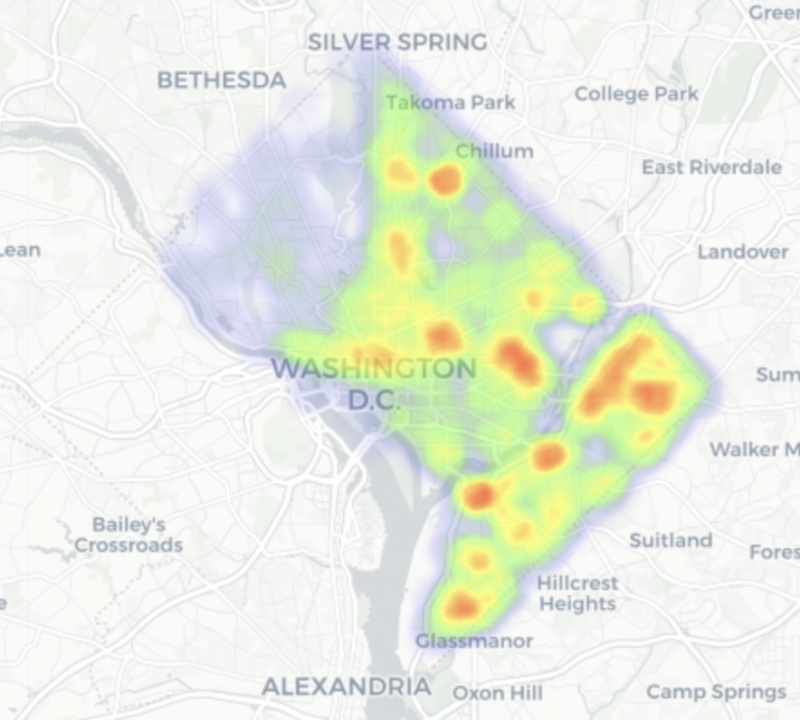
That’s because those neighborhoods have the most dangerous streets. Pedestrian-friendly neighborhoods are desirable, so they’re expensive, so they’re for the rich. Historically, poor neighborhoods are where you put freeways. The people living in Wards 7 and 8 are stuck with an auto-focused, disproportionately dangerous streetscape. Without adequate transit options, they have little choice but to reconcile themselves to it.
This adds up to a situation where ATE’s effects–both good and bad–are likely to be felt more intensely in some parts of the city than others. The streets are more dangerous, which means more cameras are deployed, which means more citations, which are received by people with fewer resources to pay them. Against that pressure, the popularity of fake tags as a response to ATE becomes a question of local habits and norms. How do people learn about fake tags? How easy is it to buy them? And how do they think they’ll be perceived by their neighbors if they put some on their car? Is it like double-parking or blocking a fire hydrant? Or is it worse?
There’s reason to believe that the pandemic helped normalize the use of fake tags. The Department of Motor Vehicles got backlogged, which led to forbearance for offenses like having invalid tags. After all, it’s unreasonable to punish someone if the city has made compliance impossible. This led to a multiyear period during which the likelihood of being punished for using fake tags dropped, which can’t have hurt their popularity.
Looking at tag-related citations as a percent of each MPD district’s total citations provides a suggestive window onto the issue’s priority in different parts of the city:
The percent of moving violation citations that are for tag-related infractions, categorized by issuing MPD district and month. Data via opendata.dc.gov. 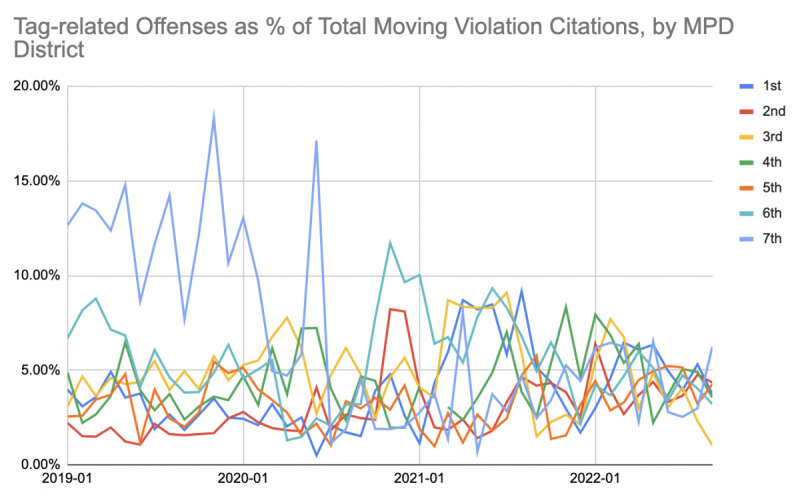
This graph is consistent with the idea that reduced enforcement during the pandemic normalized the use of fake tags to such an extent that the previous level of vigor applied to the problem by MPD in the Seventh District became untenable. It’s one thing when fake tags are limited to a small subset of drivers; when everyone’s doing it, enforcement gets more complicated. There are other possibilities, of course (maybe a district commander who hates fake tags as much as me retired because of COVID?). But I think normalization is a plausible reading.
I think that partly because the city seems to be losing its will to punish bad drivers in general (with notable help from the courts and activists). It’s hard not to feel like we’ve decided that it’s no longer worth trying to correct this class of misbehavior. It’s as if driving is too important to punish people for doing it dangerously.
Facebook is in the fake tags business
The DC DMV has stopped issuing long-lived paper tags, at least. I guess that’s something. But it hasn’t made any difference, as a quick look at Facebook Marketplace demonstrates. Note the sponsored posts–the company’s making money off of this.
Screenshots of Facebook Marketplace by the author.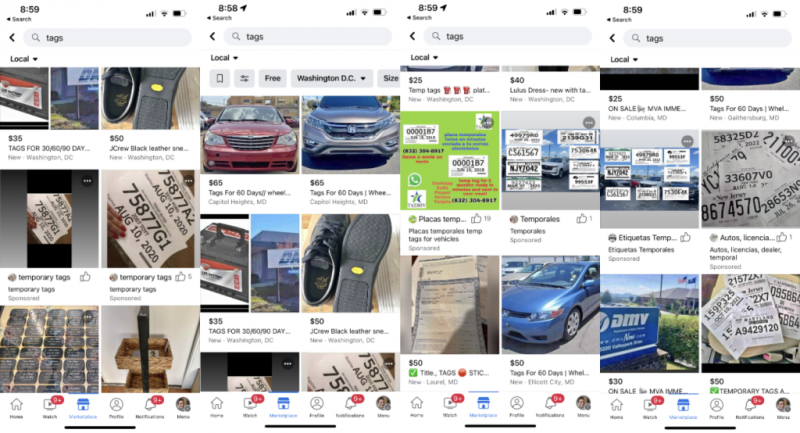
Fake tag sellers are very easy to find. Here are the titles of the first ten listings I found:
- Tags For 60 Days | Wheels & Batteries| 2 Months
- Tags For 60 Days | Whelees and Batteries| 2 months
- BATTERIES, TEMPORARY TAGS, inspection and titles (30&60&90)
- TAGS FOR 30/60/90 DAYS 100%??WHELLS//TIRES//SPANISH AND ENGLISH ?UNIVERSAL?
- ON SALE ? MVA IMMEDIATE AVAILAbILITY ? TEMP TAGS
- Tags For 60 Days | Whelees and Batteries| 2 months
- ON SALE? MVA IMMEDIATE AVAILABILITY ? TEMP TAGS
- Tags For 60 Days | Whelees & Batteries|2 months
- Tires, wheels and batteries✅ AUTOPARTS TAGS⬅️(T3MP0RAL3S)✔️ANY VEHICLES
Some of these have been taken down since I first highlighted them. But it only took me a few minutes to compile this list. There are plenty more out there.
Prices ranged from $25-65, and most offered tags for 60 days, though there were some 30- and 90-day options as well. The reuse of titles and illustrations–I was particularly fond of the ones using a stock photo of a DMV building–suggests that some individual tag entrepreneurs might be behind multiple listings. But why would they use multiple prices? The inclusion of wheels as an offering also merits attention, given the current popularity of wheel theft. But let’s try to stay focused.
I decided to take one of these services for a spin. All of them are tied to transparently fake Facebook accounts, which makes it hard to choose. I decided to randomly select one and see if I could learn more about how these operations worked. “Jorge” was very helpful and quite happy to accept the fake information I gave him. Alas, he was not as ready to incriminate himself as I would’ve liked. Otherwise, five stars.
Screenshots of partially redacted Facebook Messenger exchange by the author.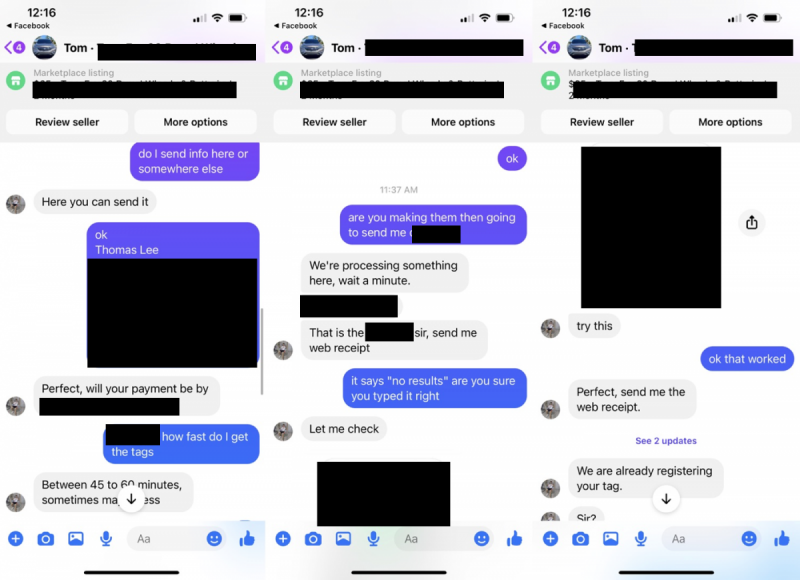
Screenshots of partially redacted Facebook Messenger exchange by the author.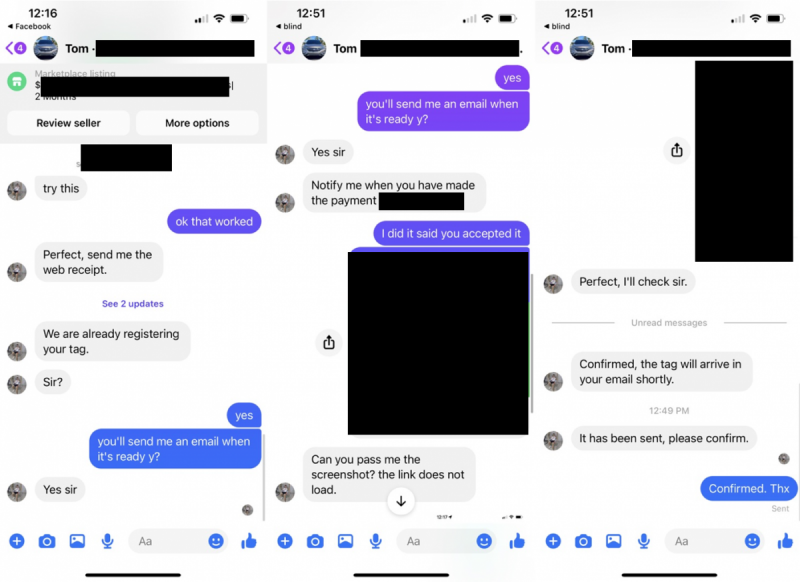
It was interesting to see Enterprise Rent-a-Car implicated. That makes me wonder if these aren’t actual credentials obtained fraudulently (perhaps via a retail employee with a side hustle), rather than just some guy with Photoshop. But someone in an AG’s office should be figuring this out, not me.
A partially redacted fake tag by the author.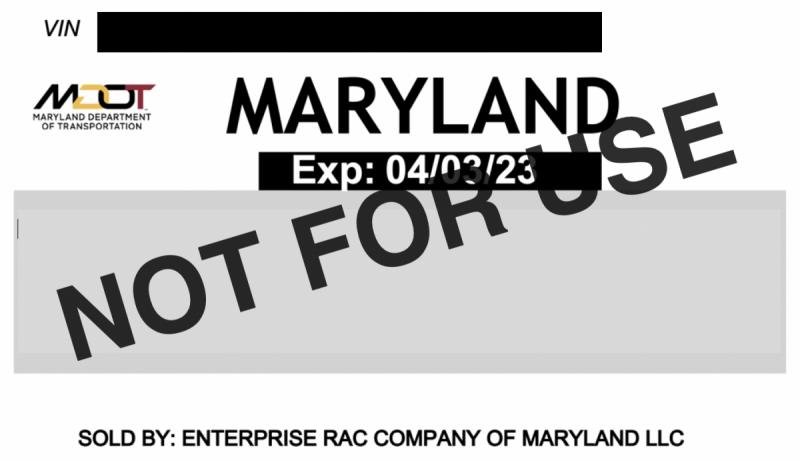
A partially redacted fake tag by the author.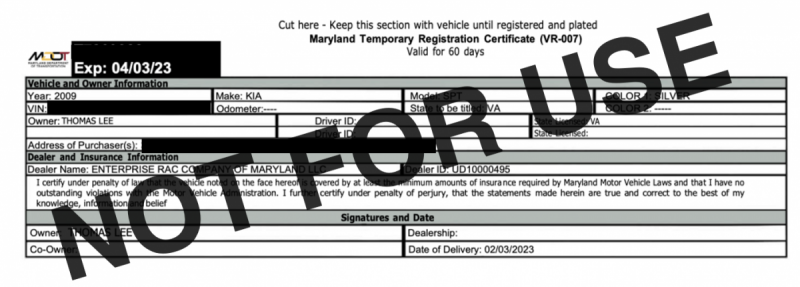
Fake tags make DC less safe
If you have read this far, you’re probably starting to worry that I’m crazy. I spent $55 just to make myself mad!
But I think this stuff matters. A driver who believes they are entitled to exempt themselves from responsibility portends bad things. They might drive more recklessly. They might not carry insurance. They might ruin someone’s life.
I think DC, Virginia, and Maryland should look at this problem again. I think they should sue Facebook over its failure to police Marketplace. I think they should figure out who owns that payment account. And I think they should give drivers with fake tags some good reasons not to use them.
What I see from city leadership and my fellow residents suggests they’re in denial about the ongoing – and increasing – tragedy that comes from cavalier misuse of our roads. It is inexcusable to ask the families who experience those tragedies to pay that price.
Editor’s note: GGWash had no involvement in any actions described in this article and does not condone illegal activities. GGWash is cross-posting this piece to shed light on an important issue.

